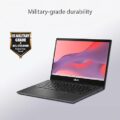The Importance of Screen Resolution: Why It Matters in a Laptop
When buying a laptop, one of the key features you’ll come across is screen resolution. But what does screen resolution mean, and why should you care about it? In this post, we’ll break down what screen resolution is, how it affects your laptop experience, and why it matters for different uses.
What is Screen Resolution?
Screen resolution refers to the number of pixels (tiny dots) that make up the display on your laptop screen. The more pixels a screen has, the clearer and sharper the images, text, and videos will look. It’s usually measured as the number of pixels across the width and height of the screen. For example, a common screen resolution is 1920×1080, which means the screen has 1,920 pixels across the width and 1,080 pixels from top to bottom.
How Screen Resolution Affects Image Quality
The higher the screen resolution, the more details you can see on your laptop screen. A laptop with a high resolution will show you sharp and clear images, which is especially important when watching movies, editing photos, or working on graphic design projects. If your screen resolution is too low, everything may look pixelated or blurry, which can be frustrating when you’re trying to enjoy HD content or work with detailed images.
For example:
- Low Resolution (1366×768): This is often found in cheaper laptops. It’s okay for basic tasks like browsing the web or writing emails, but images and videos won’t look very sharp.
- Full HD (1920×1080): This is a standard resolution for most laptops. It’s great for everyday use, including watching videos and doing office work. You’ll notice much clearer images compared to a lower resolution.
- 4K (3840×2160): This is a very high resolution often found in more expensive laptops. It’s perfect for professionals who need top-notch image quality, such as photographers and video editors. It’s also great for watching 4K movies or playing video games with stunning graphics.
Why Screen Resolution Matters
1. Better Viewing Experience
A higher resolution means better picture quality, which can make a big difference in how enjoyable your laptop is to use. Whether you’re streaming movies or working on a presentation, a sharp and detailed display can enhance your experience.
2. Improves Productivity
If you use your laptop for work, a higher resolution allows you to fit more on your screen. This is especially helpful when you’re multitasking. With a higher-resolution display, you can open multiple windows side by side without everything feeling cramped. This can make working on spreadsheets, editing documents, or browsing multiple tabs much easier.
3. Important for Creatives
If you’re into graphic design, video editing, or photography, screen resolution becomes even more important. You’ll need a high-resolution display to see the fine details in your work. For example, if you’re editing a photo, a higher resolution helps you see the true colors and sharpness of the image.
4. Gaming Experience
For gamers, screen resolution can greatly affect gameplay. A laptop with a higher resolution will give you crisper visuals and make games look more realistic. Many gaming laptops now offer Full HD or even 4K resolution, which enhances the overall gaming experience.
Balancing Screen Resolution with Battery Life
While a high-resolution screen is great for image quality, it’s important to keep in mind that it can also use more battery power. Laptops with 4K screens, for instance, might drain their batteries faster than those with lower resolutions. So, if long battery life is a priority for you, it might be worth considering a laptop with a slightly lower resolution.
Conclusion
Screen resolution is a key factor to consider when buying a laptop. It affects everything from the quality of images and videos to how productive you can be with your laptop. Whether you’re a student, professional, or gamer, understanding screen resolution helps you make a better decision when choosing the right laptop. Keep in mind the type of tasks you’ll be doing, and choose a screen resolution that fits your needs!
